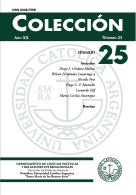Please use this identifier to cite or link to this item:
https://repositorio.uca.edu.ar/handle/123456789/7208| Título: | Iglesia católica y migración : la coordinación argentino-chilena en la asistencia al migrante bajo regímenes dictatoriales en Patagonia | Autor: | Azconegui, María Cecilia | Palabras clave: | IGLESIA CATOLICA; MIGRACION; DICTADURA; SOCIEDAD; ESTADO; POLITICA | Fecha de publicación: | 2015 | Editorial: | Pontificia Universidad Católica Argentina. Facultad de Ciencias Sociales. Departamento de Ciencias Políticas y Relaciones Internacionales | Cita: | Azconegui, M. C. Iglesia católica y migración : la coordinación argentino-chilena en la asistencia al migrante bajo regímenes dictatoriales en Patagonia [en línea]. Colección.2015, 25. Disponible en: https://repositorio.uca.edu.ar/handle/123456789/7208 | Resumen: | Resumen: La migración chilena hacia la Patagonia argentina adquirió características particulares a partir del derrocamiento del gobierno constitucional de Salvador Allende por el golpe de estado encabezado por el general Augusto Pinochet el 11 de septiembre de 1973. La extensión y permeabilidad de la frontera trasandina convirtieron a la Argentina en una de las mejores opciones para los sectores más vulnerables, sobre todo para quienes carecían de protección y de contactos partidarios para organizar su partida. Este acontecimiento histórico dio comienzo al exilio de miles de chilenos. La vulnerabilidad de los migrantes chilenos que llegaban a diario a las diócesis de la Patagonia argentina motivó la organización de encuentros eclesiales binacionales y una acción pastoral orientada específicamente a ellos. Este artículo examina los documentos y publicaciones emitidos luego de los encuentros patagónicos binacionales de obispos y de agentes pastoral de migración en la década del setenta y se propone esclarecer la perspectiva adoptada por la Iglesia Católica frente al nuevo fenómeno regionaL, analizar el carácter de sus intervenciones y determinar las características que adquirió la relación Iglesia, Estado y sociedad en el marco de esta problemática específica. Abstract: Chilean migration to Patagonia in Argentina had special features since the overthrow of the constitutional government of Salvador Allende in the coup led by General Augusto Pinochet on September 11, 1973. This historic event began the exile of thousands of Chileans. The extent and permeability of the border turned Argentina into one of the best options for the most vulnerable sectors, especially those without protection and political contacts to organize their departure. The vulnerability of Chilean migrants arriving daily to the dioceses of Argentina in Patagonia motivated the organization of binational ecclesial meetings and pastoral activities specifically geared to them. This article examines the documents and publications issued after these binational meetings of bishops and pastoral agents of migration in the seventies, and intends to clarify the approach taken by the Catholic Church towards the new regional phenomenon, analyze the nature of their interventions and determine the features that took the relationship among the Church, the state and the society in the context of this specific problem. |
Cobertura Espacial: | ARGENTINA CHILE PATAGONIA |
URI: | https://repositorio.uca.edu.ar/handle/123456789/7208 | ISSN: | 0328-7998 1850-003X (edición online) |
Disciplina: | CIENCIA POLITICA | Derechos: | Acceso Abierto | Fuente: | Colección, 25, 2015 |
| Appears in Collections: | COL - 2015 Año XX nro. 25 |
Files in This Item:
| File | Description | Size | Format | |
|---|---|---|---|---|
| iglesia-migracion-coordinacion-migrante.pdf | 281,07 kB | Adobe PDF |  View/Open |
Page view(s)
119
checked on Apr 30, 2024
Download(s)
171
checked on Apr 30, 2024
Google ScholarTM
Check
This item is licensed under a Creative Commons License

